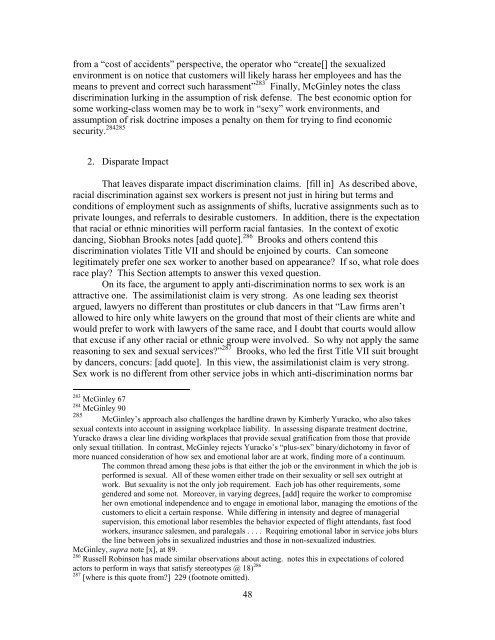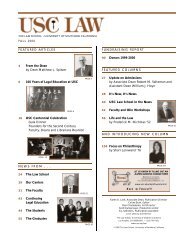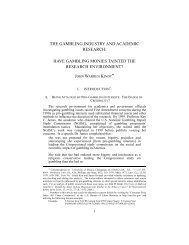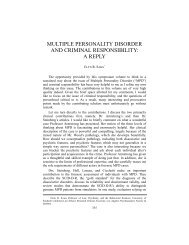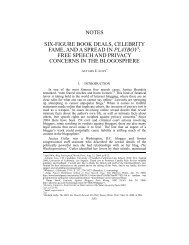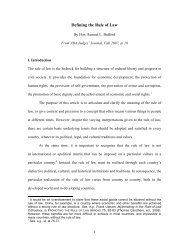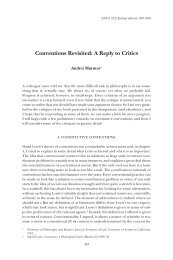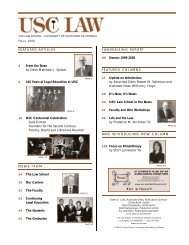1 Regulating Sex Work Adrienne D. Davis VERY ROUGH DRAFT ...
1 Regulating Sex Work Adrienne D. Davis VERY ROUGH DRAFT ...
1 Regulating Sex Work Adrienne D. Davis VERY ROUGH DRAFT ...
Create successful ePaper yourself
Turn your PDF publications into a flip-book with our unique Google optimized e-Paper software.
from a “cost of accidents” perspective, the operator who “create[] the sexualized<br />
environment is on notice that customers will likely harass her employees and has the<br />
means to prevent and correct such harassment” 283 Finally, McGinley notes the class<br />
discrimination lurking in the assumption of risk defense. The best economic option for<br />
some working-class women may be to work in “sexy” work environments, and<br />
assumption of risk doctrine imposes a penalty on them for trying to find economic<br />
security. 284285<br />
2. Disparate Impact<br />
That leaves disparate impact discrimination claims. [fill in] As described above,<br />
racial discrimination against sex workers is present not just in hiring but terms and<br />
conditions of employment such as assignments of shifts, lucrative assignments such as to<br />
private lounges, and referrals to desirable customers. In addition, there is the expectation<br />
that racial or ethnic minorities will perform racial fantasies. In the context of exotic<br />
dancing, Siobhan Brooks notes [add quote]. 286 Brooks and others contend this<br />
discrimination violates Title VII and should be enjoined by courts. Can someone<br />
legitimately prefer one sex worker to another based on appearance? If so, what role does<br />
race play? This Section attempts to answer this vexed question.<br />
On its face, the argument to apply anti-discrimination norms to sex work is an<br />
attractive one. The assimilationist claim is very strong. As one leading sex theorist<br />
argued, lawyers no different than prostitutes or club dancers in that “Law firms aren’t<br />
allowed to hire only white lawyers on the ground that most of their clients are white and<br />
would prefer to work with lawyers of the same race, and I doubt that courts would allow<br />
that excuse if any other racial or ethnic group were involved. So why not apply the same<br />
reasoning to sex and sexual services?” 287 Brooks, who led the first Title VII suit brought<br />
by dancers, concurs: [add quote]. In this view, the assimilationist claim is very strong.<br />
<strong>Sex</strong> work is no different from other service jobs in which anti-discrimination norms bar<br />
283 McGinley 67<br />
284 McGinley 90<br />
285 McGinley’s approach also challenges the hardline drawn by Kimberly Yuracko, who also takes<br />
sexual contexts into account in assigning workplace liability. In assessing disparate treatment doctrine,<br />
Yuracko draws a clear line dividing workplaces that provide sexual gratification from those that provide<br />
only sexual titillation. In contrast, McGinley rejects Yuracko’s “plus-sex” binary/dichotomy in favor of<br />
more nuanced consideration of how sex and emotional labor are at work, finding more of a continuum.<br />
The common thread among these jobs is that either the job or the environment in which the job is<br />
performed is sexual. All of these women either trade on their sexuality or sell sex outright at<br />
work. But sexuality is not the only job requirement. Each job has other requirements, some<br />
gendered and some not. Moreover, in varying degrees, [add] require the worker to compromise<br />
her own emotional independence and to engage in emotional labor, managing the emotions of the<br />
customers to elicit a certain response. While differing in intensity and degree of managerial<br />
supervision, this emotional labor resembles the behavior expected of flight attendants, fast food<br />
workers, insurance salesmen, and paralegals . . . . Requiring emotional labor in service jobs blurs<br />
the line between jobs in sexualized industries and those in non-sexualized industries.<br />
McGinley, supra note [x], at 89.<br />
286 Russell Robinson has made similar observations about acting. notes this in expectations of colored<br />
actors to perform in ways that satisfy stereotypes @ 18) 286<br />
287 [where is this quote from?] 229 (footnote omitted).<br />
48


